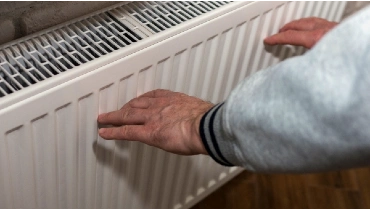
Home radiator systems come in many types and can be used as a sole heat source, or supplemental to a primary heating type, like a furnace. Although each type utilizes the same heating process of convection, there are differences in their fuel type including steam, hot water, and electricity. Therefore, determining the appropriate type, size, or number of units for your space will depend on several factors.
Does Radiator Size Matter?
Choosing the right radiator size is vital for overall heating efficiency. If a radiator is too big, a lot of energy will be wasted—increasing your heating bill. If a radiator is too small, its heat output won’t be sufficient to heat the space to the correct temperature, defeating the purpose of installing a radiator in the first place. Some rooms may require multiple units for adequate heating.
How Many Radiators Do I Need in a Room?
If you’re planning to heat a larger room, sometimes a larger radiator size isn’t the best option. Multiple radiators will be able to move heat more evenly around the room and add up to the correct heating output needed. That’s why it’s sometimes suggested that you have one radiator per 5 cubic meters of space.
To calculate this, you’ll need to measure the volume of the space you’re heating. This is done by multiplying the length, width, and height of the room: L (ft) x W (ft) x H (ft) = volume in cubic feet (ft³).
To ensure the heat output of your radiators correctly matches the room size, you’ll have to further calculate the BTU (heating output).
What Are BTUs in Radiators?
BTU stands for British Thermal Units, which is how the radiator efficiency is measured, or rather how much heat it will emit. This unit of measurement is defined as the amount of energy needed to raise the temperature of one pound of water one degree Fahrenheit.
How to Calculate Radiator BTU for a Room
Once you’ve determined the volume of your room with the formula above, take that room volume and multiply it to get an idea of the BTUs per hour needed. The formula for a standard bedroom would be Volume (ft³) x 4 = BTU output. This will give you a rough estimate of the correct BTU output needed based on average bedroom heating efficiency and design. However, the multiplied number may need to be bigger or smaller depending on the room type and size. For a larger space such as a lounge or dining space, multiply that volume by 5 instead, and for smaller common areas or kitchens, multiply by 3. With this, you can begin to determine the average heat output needed for a radiator in your space, and whether you’ll need one or multiple radiators with BTUs that add up to this amount.
However, there are several additional factors to consider when sizing a radiator for a room. Other things an HVAC technician will factor in when calculating BTU for you:
- Room temperature. Most room types will have an average, ideal temperature. To meet these temperature needs, the correct BTU will need to be calculated to match it.
- Room location. A room located in the basement versus the top floor will need a higher BTU due to the nature of the heat rising.
- Climate type. Hotter climates won’t need as high of a BTU as colder climates due to the difference in heat output needed.
- Windows. The amount of natural light and window efficiency will determine whether you need a higher or lower BTU.
- Insulation. If you have insufficient insulation above, below, or around the room you are heating, you will need a higher BTU and vice versa.
- Flooring type. Different flooring materials will either better retain or lose heat.
Because of the many factors to consider when choosing the right radiator size, it’s best to consult with a licensed HVAC technician about sizing and installing a radiator in your home.
Need Help Choosing the Correct Radiator Size?
Finding the right radiator size or the number of smaller radiators for a room requires specific calculations and know-how that the average homeowner may not know. Ultimately, utilizing an HVAC professional to make this determination can help save you time and effort and make heating more efficient.
For the best, most energy-efficient, and cost-effective radiator sizing, count on your local Aire Serv. Call us today or request an appointment online to learn more.

